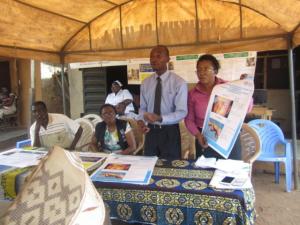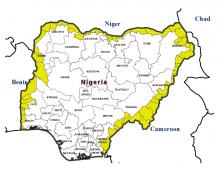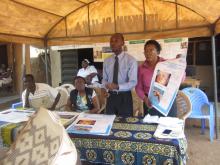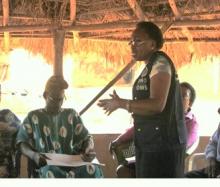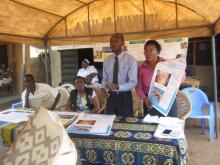Nigeria enhances acute flaccid paralysis surveillance along international borders
Abuja, Nigeria 19 February, 2015 - The World Health Organization (WHO) State office in Ogun, in collaboration with the State Ministry of Health (SMOH), has intensified surveillance activities along international border communities to ascertain the sensitivity of the surveillance system at priority sites and close any surveillance gaps as a major step towards achieving the realization of the temporary recommendations to reduce international spread of polio.
The first lap, in a series of activities to be conducted in 2015, was an advocacy and sensitization meetings on acute flaccid paralysis (AFP) surveillance to communities along the Nigeria and Republic of Benin frontiers, from 16 to 17 February 2015.
Sixteen states, 60 Local Government Areas (LGAs) and 201 political wards in Nigeria share international borders with Chad, Cameroon, Niger and Benin. In 2014, Nigeria, Cameroon and Equatorial Guinea were the only countries in close proximity that reported wild poliovirus cases. Therefore, quality international border surveillance is of critical importance especially now with fewer cases of polio been reported.
Moreover, the Director-General of WHO had on 5 May 2014 declared the international spread of wild poliovirus a public health emergency of international concern (PHEIC) under the International Health Regulations and underscored the need to improve cross border surveillance, and strengthen routine immunization.
Ogun is one of the four southern States (others being Abia, Lagos and Oyo) that reported poliovirus cases last in 2009. The State has a surveillance population of 2.3 million and three of its LGAs have international borders with Republic of Benin. The non-polio AFP rates in the state in 2012, 2013 and 2014 are 5.2, 7.8 and 9.1 respectively.
Addressing local leaders during both advocacy and sensitization meetings with influential community leaders of Ilara/Ikanga as well as Ohumbe/Obele; residing along the international boundaries of Nigeria and Republic of Benin, the Ogun State epidemiologist, Dr Hakeem Yusuf emphasized the need to mobilize communities in order to raise awareness on early detection and reporting of AFP cases.
“We need to collaborate to close surveillance gaps if the desired goal of polio eradication is to be achieved,” the epidemiologist stated.
Similarly, Dr Philips Majebi, the WHO Ogun State Coordinator, urged the participants at the gathering to report not only cases of AFP, but also other epidemic-prone diseases, including measles, avian influenza and Ebola amongst other IDSR and PHEIC.
“WHO will continue to provide the necessary technical and logistics support to ensure that we achieve and maintain a certification standard surveillance system in the State”, she added.
AFP surveillance is the bedrock of the polio eradication programme. The country has consistently met the minimum requirement for the two key surveillance indicators for the last ten years. This is a reflection of the quality of AFP surveillance in Nigeria. The proportion of the 774 LGAs that have met the two key indicators in 2012, 2013 and 2014 was 92%, 93% and 97% respectively.
WHO Country Office in Nigeria has the requisite structure to support government implement all facets of the temporary recommendations to reduce international spread of polio states with other countries.



